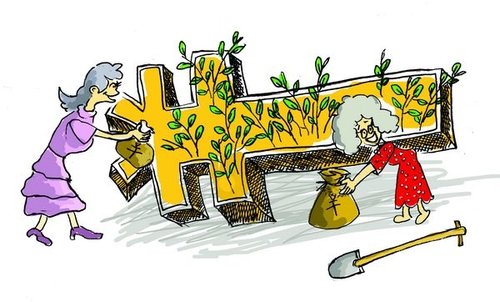For that reason, it's smart to have a portion of your fixed-income investments in Treasury inflation-protected securities, or TIPS. These bonds are backed by the U.S. government, like normal Treasury papers, but also have built-in protections that boost returns to account for inflation.
出于这个原因,在你的固定收益投资中持有部分财政部通货膨胀保值债券(TIPS)当是明智之举。同普通美国国债一样,这些债券不但得到了美国政府的支持,而且本身还具有保护功能,可在通货膨胀时提高回报率。

Another inflation-hedging strategy is to invest in commodities. When growth resumes, demand for oil, copper and other commodities will rise, making their prices increase. A warning, though: Given the volatility of commodities, financial planners recommend that investors have no more than 5% to 10% of their portfolio in this sector.
另一个对冲通货膨胀的策略是投资大宗商品。当经济恢复增长时,对石油、铜和其他大宗商品的需求将会增加,从而将推动它们的价格上涨。不过,应该注意:鉴于商品的波动性,理财规划师建议,投资者对这部分的投资不应超过其投资组合的5%至10%。
Have a Stock-Market Strategy
要有股市投资战略
Despite the recent sprint in share prices, investors remain leery of the stock market. It will take more than a four-week rally to soothe the pain caused by the stock market since it tumbled from its late-2007 highs. When so much doubt surrounds the stock market, it's usually a time to think about investing in equities. Despite the horrid pain most of us have suffered in the market during the past 18 months, stocks, like the economy, will not remain down forever.
尽管最近股价有所上扬,但投资者对股市仍应持警惕态度。股市自 2007年末不断创出新高后一路下跌,这种情况造成的损失不是靠一轮为时 4周的上涨就能消除的。当有这么多的怀疑笼罩着股市时,通常也就到了考虑投资股市的时候了。尽管过去 18个月里我们大部分人都在股市上遭受了切肤之痛,但股市和经济一样,不会永远保持低迷状态。












